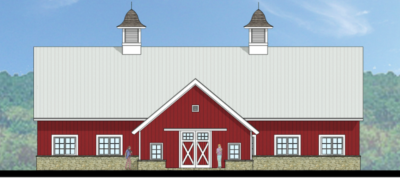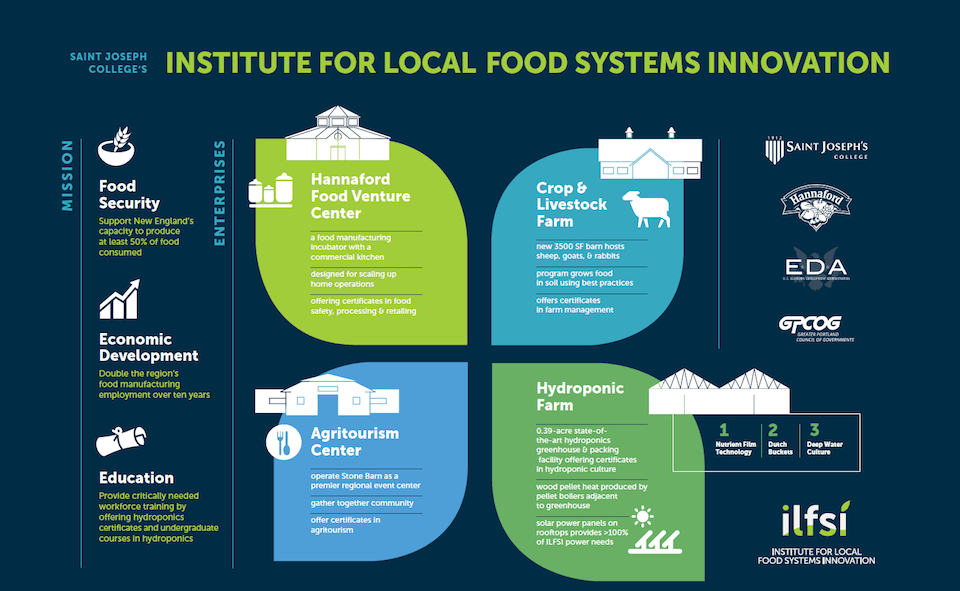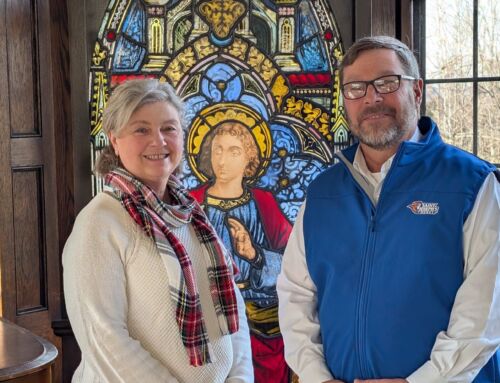While growing Maine’s food and beverage industry
by Manuela Arundel
Later this year, Saint Joseph’s College will break ground for the one-third-acre hydroponic greenhouse of the Institute for Local Food Systems Innovation, and, soon thereafter, launch its first competency-based courses and certificate programs in hydroponic culture. The Institute consists of five enterprises: a food venture center, a hydroponic farm, a traditional crop and livestock farm, an agritourism event center, and an entrepreneurship development and educational program offering certificates in areas such as hydroponic farming, food processing, and food merchandising.
Spearheaded by Peter Nielsen, Saint Joseph’s Entrepreneur-in-Residence and Executive Director of Mission-Aligned Business, the Institute is a strategic partnership with federal, regional, and local governments, as well as corporations, individuals, and industry supporting organizations. It pursues the College’s long-standing initiatives in sustainability and community engagement, while contributing solutions to Maine’s need to recover manufacturing jobs, develop the state’s food and beverage industry, and meet regional food security goals.
“Currently, New England produces 10% of its own food,” says Nielsen. “Food Solutions New England has set a goal of producing 50% of our own food by 2060. By helping local farmers and food manufacturers scale up their operations and bring value-added products to a wider market place, the Institute for Local Food Systems Innovation will help us meet that food security goal.”
“By helping local farmers and food manufacturers scale up their operations and bring value-added products to a wider market place, the Institute for Local Food Systems Innovation will help us meet that food security goal.”
Saint Joseph’s College was awarded a $2 million public works project by the U.S. Economic Development Administration to build the infrastructure required for the launch of the Institute, which will be matched by $2 million that the College is raising from other sources, including a $500,000 award from the Hannaford Charitable Foundation. The full project includes the greenhouse, a food venture center, a livestock barn, a wood pellet boiler system, and connection to the municipal water line. Construction is scheduled to run into 2021.
Innovation Hub
The Institute is being designed as an innovation hub and center of excellence. It will be a collaborative community made up of members with a wide array of knowledge. It will facilitate creativity and collaboration across Maine’s food and beverage industry and seek to localize global entrepreneurial culture.
The hydroponic farm, for example, is designed to provide leadership and educational opportunities to develop a workforce for this emerging industry and disseminate knowledge regarding techniques that will accelerate the growth of hydroponic farming and improve its efficiency. The one-third-acre “laboratory” will offer educational programming for undergraduates that include courses in hydroponics, plant physiology, and botany, as well as a Certificate in Hydroponic Culture consisting of approximately 160 hours in training time. The Certificate—comprised of a core curriculum course and several short courses ranging from plant physiology to managing a commercial hydroponic farm—will attract a diverse body of students and help educate the workforce for the future of the food economy.
State of the Art Infrastructure
The Institute is being developed on a 28.61-acre parcel owned by Saint Joseph’s, opposite the main entrance to the campus. The primary production center is a hydroponic greenhouse, which will be located to the north of the Stone Barn, the only building currently on the property. Programming in this space will include the operational farm, as well as year-round educational programming.
New jobs on campus will be created for students, and internships are already in place for students to participate in the planning and development of the Institute.
The structure will consist of a five-bay connected greenhouse, with each bay measuring 35 feet by 96 feet, with a total greenhouse growing area of 16,800 square feet.
Production will be year-round and will be accomplished using a mix of three different hydroponic growing techniques: Deep Water Culture, Nutrient Film, and Dutch Bucket hydroponic techniques. In a six-week crop cycle, the total yield is estimated to be 6,928 heads of lettuce per week, or 360,256 heads of lettuce per year. A four-week crop cycle, which is the ultimate goal, could produce over 500,000 head per year.
Produce will be sold to Saint Joseph’s dining services, to wholesale distributors that deliver to the College’s dining services, and other markets locally.

The Hannaford Food Venture Center is designed for the scale-up of small scale food processing businesses. Available to local food and beverage entrepreneurs through a membership model, the venture center provides critical infrastructure for start-ups and growing enterprises, as well as an educational environment for industry training. Design and renderings by Oak Point Associates.
The Hannaford Food Venture Center will be built to the south of the greenhouse and adjacent to the Stone Barn. Visible from Whites Bridge Road, the new 3,632 square feet octagonal building will reflect an architectural design that pays homage to the traditional round barns built in the United States between 1880 and 1920.
The Hannaford Food Venture Center will serve as a commercial kitchen designed for the scale-up of home operations, and will include a central community exhibition area, kitchen spaces, cooking lines, prep stations, dry storage areas, large freezer and refrigeration areas, as well as a classroom functionality. The Venture Center will operate on a membership model, and offer certificates in Food Safety, Food Processing, and Food Retailing.
Located next to the forthcoming Hannaford Food Venture Center, the Stone Barn is a historical building that was part of the property’s original Verrill estate. In 2016, Saint Joseph’s renovated the early 20th century barn to serve as an event center. An agritourism destination, the Stone Barn is already operational as a premier regional event center, hosting weddings, food industry strategists, and the agricultural community. As part of the Institute, the Stone Barn will be the learning environment for a Certificate in Agritourism.
Additional courses and certificates will be offered through the Institute’s Crop and Livestock Farm. Areas around the greenhouse will be available for soil cultivation using traditional methods and contemporary best practices. The program will also work to develop innovative methods for erosion control, composting, and other farm management needs. The livestock program will be located on the seven-acre pasture near White Bridges Road and include sheep, goats, and rabbits.

The livestock barn, scheduled to be completed within 3 years, will be home to a small sheep farm. Nursing students have played an active role in the lambing process at the College in recent years, and the new barn is designed to facilitate this and other educational program features. Design and renderings by Oak Point Associates.
Access to the new infrastructure, and to the community and industry it serves, will undoubtedly lead to new opportunities to enhance and develop the College’s undergraduate programs. In addition, new jobs on campus will be created for students, and internships are already in place for students to participate in the planning and development of the Institute.
Economic Catalyst
Originally selected as a Greater Portland Council of Governments (GPCOG) catalyst project, the Institute for Local Food Systems Innovation has recently entered into a partnership with GPCOG where the Institute will take on stewardship of the Portland Region Food Foundry, a U.S. Department of Commerce-led initiative designed to assist communities in developing comprehensive strategies to strengthen the local manufacturing sector and to attract business investment that creates better paying jobs and makes our region more globally competitive.
“Our partnership with GPCOG will allow us to become an even greater economic catalyst for the region,” says Nielsen. “The Institute for Local Food Systems Innovation positions the College to play a key role in convening industry and community leaders in Maine to advance the vision of strengthening the region’s economy through the growth of the local food industry. Our leadership here is an extension of our mission to educate and serve the community.”
In 2004 the College purchased the Gowen Farm, across Whites Bridge Road from the main entrance to campus. Students began farming, the Stone Barn was renovated, and now three new buildings and regional partnerships position Saint Joseph’s to be a critical leader in the growth of Maine’s food economy and the development of a well-prepared workforce.
The Institute for Local Food Systems Innovation will entail growing crops year-round without soil in a climate controlled, state-of-the-art hydroponic greenhouse. The greenhouse will contain five bays, consisting of 16,800 square feet on .39 acres of land across from the main entrance of the College on Whites Bridge Road. Lighting, venting, fans, and nutrients will ensure that food grows consistently and uniformly through all four of Maine’s seasons. Greenhouse Illustration: FarmTek.



